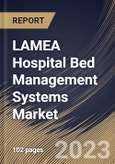Hospitals and healthcare systems increasingly recognize the importance of operational efficiency in delivering high-quality care. HBMS plays a pivotal role in streamlining hospital operations, reducing administrative burdens, and improving the overall efficiency of healthcare facilities. This focus on efficiency contributes to the growth of the market. HBMS contributes to better capacity planning by providing insights into bed occupancy rates, peak admission periods, and other relevant data. Healthcare facilities can use this information to plan for surges in patient volume, allocate staff resources effectively, and enhance overall operational preparedness.
Many HBMS providers are developing mobile applications that enable healthcare staff to request and manage bed assignments on the go. This trend aligns with the growing reliance on mobile solutions in healthcare and ensures that relevant stakeholders have instant access to critical bed management information. Interoperability and standardization are becoming key considerations in the evolution of HBMS. Standardized data exchange protocols facilitate seamless integration with other healthcare IT systems, promoting interoperability and enhancing the overall efficiency of healthcare operations.
The rising prevalence of CVD leads to an increased number of hospital admissions for cardiovascular-related conditions in the Middle East. HBMS becomes essential for optimizing bed allocation in the Middle East, ensuring that patients with acute cardiac events or chronic cardiovascular conditions receive timely and appropriate care. HBMS integration with cardiac imaging and monitoring systems enhances the comprehensive care of cardiac patients in the Middle East. As per the National Library of Medicine, the Middle East has a high rate of cardiovascular disease (10.1%). In this region, the prevalence of dyslipidemia (43.3%) is double that of hypertension (26.2%) and diabetes mellitus (16%). The factors mentioned above will drive the regional market growth.
The Brazil market dominated the LAMEA Hospital Bed Management Systems Market, by Country in 2022, and would continue to be a dominant market till 2030; thereby, achieving a market value of $77.6 Million by 2030. The Argentina market is registering a CAGR of 12.5% during (2023 - 2030). Additionally, The UAE market would showcase a CAGR of 11.6% during (2023 - 2030).
Based on Deployment, the market is segmented into Cloud & Web Based, and On-premise. Based on Type, the market is segmented into Acute Care Bed, Critical Care Bed, Long-term Care Bed, and Others. Based on countries, the market is segmented into Brazil, Argentina, UAE, Saudi Arabia, South Africa, Nigeria, and Rest of LAMEA.
The market research report covers the analysis of key stake holders of the market. Key companies profiled in the report include Oracle Corporation, Epic Systems Corporation, GE HealthCare Technologies, Inc., HealthStream, Inc., TeleTracking Technologies, Inc., SAP SE, JVS Group, Advanced Data Systems Corporation, NextGen Healthcare, Inc., and McKesson Corporation.
Scope of the Study
Market Segments Covered in the Report:
By Deployment- Cloud & Web Based
- On-premise
- Acute Care Bed
- Critical Care Bed
- Long-term Care Bed
- Others
- Brazil
- Argentina
- UAE
- Saudi Arabia
- South Africa
- Nigeria
- Rest of LAMEA
Key Market Players
List of Companies Profiled in the Report:
- Oracle Corporation
- Epic Systems Corporation
- GE HealthCare Technologies, Inc.
- HealthStream, Inc.
- TeleTracking Technologies, Inc.
- SAP SE
- JVS Group
- Advanced Data Systems Corporation
- NextGen Healthcare, Inc.
- McKesson Corporation
Unique Offerings
- Exhaustive coverage
- The highest number of Market tables and figures
- Subscription-based model available
- Guaranteed best price
- Assured post sales research support with 10% customization free
Table of Contents
Companies Mentioned
- Oracle Corporation
- Epic Systems Corporation
- GE HealthCare Technologies, Inc.
- HealthStream, Inc.
- TeleTracking Technologies, Inc.
- SAP SE
- JVS Group
- Advanced Data Systems Corporation
- NextGen Healthcare, Inc.
- McKesson Corporation








